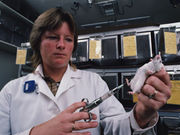Findings in mice; whether link applies to humans isn’t clear
TUESDAY, Aug. 23, 2016 (HealthDay News) — Repeated treatments with antibiotics have been linked to the development of type 1 diabetes in mice, according to a study published online Aug. 22 in Nature Microbiology.
Martin Blaser, M.D., a professor of translational medicine and microbiology at the NYU Langone Medical Center in New York City, and colleagues looked at the effects of antibiotics on non-obese mice that were susceptible to type 1 diabetes. The team used very young mice, similar in age to a 6- month to 1-year old child. The mice were given pulsed antibiotic therapy (three doses at different time periods), a continuous but very low dose of antibiotics, or no antibiotics.
Mice exposed to the pulsed therapy were twice as likely to develop type 1 diabetes as mice that got no antibiotics. Blaser told HealthDay that antibiotics led to a change in the microbiome in the gut. Those changes resulted in other changes, including alterations in T cells. That, in turn, led to increased inflammation in the insulin-producing islet cells of the pancreas, he said. The researchers also transferred some of the changed gut microbiota from the antibiotic-exposed mice to two other groups of mice. This increased the risk of type 1 diabetes in one group, but not the other.
“These findings show that early-life antibiotic treatments alter the gut microbiota and its metabolic capacities, intestinal gene expression and T-cell populations, accelerating type 1 diabetes onset in non-obese diabetic mice,” the authors conclude.
Full Text (subscription or payment may be required)
Copyright © 2016 HealthDay. All rights reserved.








